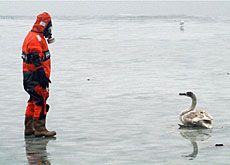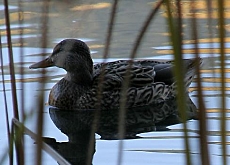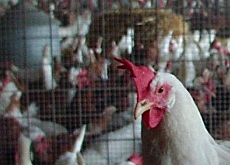Bird flu reaches Swiss border

The Federal Veterinary Office has said that there is now a real danger of the H5N1 virus reaching Switzerland.
The director of the office, Hans Wyss, made his comments on Saturday to the news agency, AP, after cases were discovered on the German-Swiss border and in France not far from Geneva.
Early on Saturday, France confirmed that it found the virus at a farm 100 kilometres from Geneva where thousands of turkeys had died, in what is the first case of H5NI on a farm in the European Union.
Germany confirmed later in the day that a wild duck found near Lake Constance – the body of water which forms the German-Swiss-Austrian border in the northeast – carried the deadly strain.
Wyss said if and when cases were discovered in Switzerland, the government would set up a 10km protective zone.
Otherwise, he said, the government has taken all necessary measures, including a decision to confine all poultry to their cages. The ban went into effect last Monday.
None of the 87 birds found dead in Switzerland over the past few weeks have tested positive for the virus.
Wyss said France had acted promptly to prevent a further spread of the disease, eliminating all of the 11,000 turkeys on the affected farm.
EU concerns
The EU health authorities have warned Europeans that they must learn to live with bird flu.
“Given that the virus is everywhere now, it’s a problem that will stay for some time,” the EU’s health commissioner, Markos Kyprianou, said on Friday.
“We have the measures, we have the legislation, we have the experience to deal with similar problems. We have done so in the past, we can deal with it now and in the future,” Kyprianou added.
Earlier this week, the EU approved the vaccination of certain poultry in France and the Netherlands.
But the Swiss authorities said Switzerland was not about to follow suit.
A spokesman for the veterinary office said vaccinations only made sense if the virus was widespread, as in Asia, and if it was no longer possible to eradicate it.
Bird flu remains essentially an animal disease, but has killed more than 90 people since late 2003. Victims contract the virus through close contact with infected birds.
Human deaths have yet to be reported in Europe, but experts fear it is only a matter of time before it changes into a form that passes easily between humans, sparking a pandemic in which millions could die.
swissinfo with agencies
There are 30,000 poultry farmers in Switzerland with eight million hens, geese and ducks.
The authorities ordered all poultry to be confined indoors from last Monday.
The first confinement lasted from October 25 to December 15, 2005.
Bird flu has been known for decades. The first known case of a human contracting the disease was in Hong Kong in 1997.
It spread in the following years to about a dozen other Asian nations, and arrived in Europe – Turkey, Romania and Croatia – last year.
The first cases were registered in Africa at the beginning of this month.
The H5N1 virus was found in dead birds in six European countries, including France, Italy, Germany and Austria.
Around 170 people have contracted the disease worldwide, and 90 of them have died.

In compliance with the JTI standards
More: SWI swissinfo.ch certified by the Journalism Trust Initiative



You can find an overview of ongoing debates with our journalists here. Please join us!
If you want to start a conversation about a topic raised in this article or want to report factual errors, email us at english@swissinfo.ch.